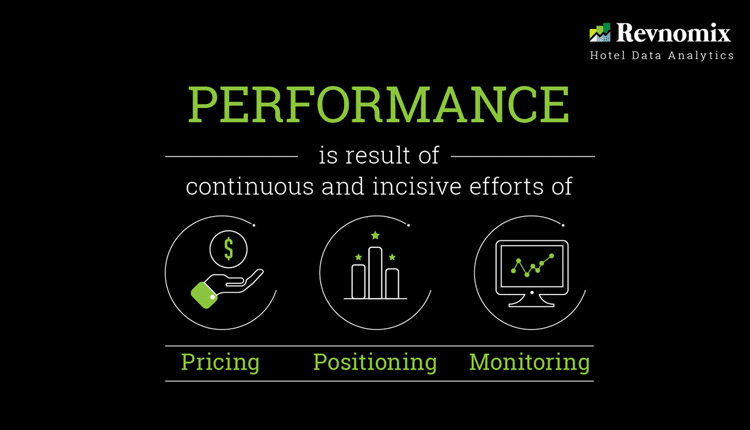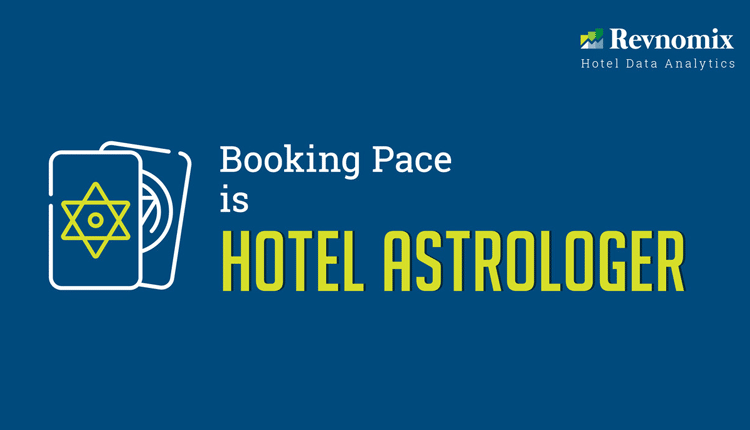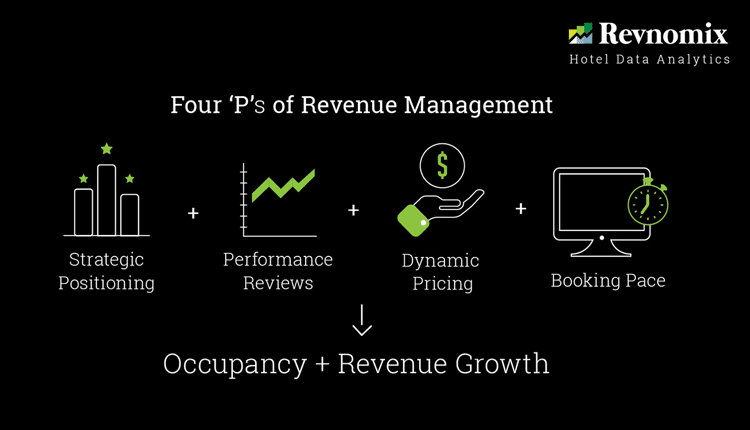Tag Archives: ps of revenue management

Revenue Management is a technique to optimize income revenue from a fixed, but perishable inventory. The challenge is to sell the right rooms to the right customer at the right time for the right price. So far we have discussed the key factors of Pricing, Positioning and Pace that impact the revenue management process. In the final installment of the 4-part blog series on the 4 Ps of Revenue Management, we are going to focus on the element of Performance.
Performance is a reflection of your hotel’s strategies and the effectiveness of strategy implementation. It is the process of looking for improvements on an on-going basis through historical data analysis. Mostly performance is perceived as analysing historical information and utilizing the reports to setup future benchmarking/budgeting.
The historical data, if analyzed accurately, can offer key insights into the performance of the hotel. It can produce historical trends such as patterns like, day of week, booking pace by day of week, demand & value trends. One can even derive the booking pace for a particular segment, source, origin of business etc. Historical Performance data can be utilized to forecast topline revenue, cost and profitability of the Hotel at multiple levels including segment profitability.
Key factors to consider:-
- Utilize Historical Performance to define business strategies such as budget.
- Historical Performance patterns should be studied before changing strategies.
- Utilize historical data to analyze the “Best Business Mix” for the hotel considering the segment profitability, which will yield highest possible profits for your asset.
- Data integrity will play major role in your success; good data will provide valuable, actionable insights whereas bad data will lead to bad conclusions. Hotel must track data appropriately at first place.
We hope that this 4-part blog series have given you a better understanding of the Revenue Management process. Contact us on info@revnomix.com for any revenue management requirements for your hotel.

Revenue Management is a technique to optimize income revenue from a fixed, but perishable inventory. The challenge is to sell the right rooms to the right customer at the right time for the right price. So far we have discussed the key factors of Pricing, Positioning and Pace that impact the revenue management process. In the final installment of the 4-part blog series on the 4 Ps of Revenue Management, we are going to focus on the element of Performance.
Performance is a reflection of your hotel’s strategies and the effectiveness of strategy implementation. It is the process of looking for improvements on an on-going basis through historical data analysis. Mostly performance is perceived as analysing historical information and utilizing the reports to setup future benchmarking/budgeting.
The historical data, if analyzed accurately, can offer key insights into the performance of the hotel. It can produce historical trends such as patterns like, day of week, booking pace by day of week, demand & value trends. One can even derive the booking pace for a particular segment, source, origin of business etc. Historical Performance data can be utilized to forecast topline revenue, cost and profitability of the Hotel at multiple levels including segment profitability.
Key factors to consider:-
- Utilize Historical Performance to define business strategies such as budget.
- Historical Performance patterns should be studied before changing strategies.
- Utilize historical data to analyze the “Best Business Mix” for the hotel considering the segment profitability, which will yield highest possible profits for your asset.
- Data integrity will play major role in your success; good data will provide valuable, actionable insights whereas bad data will lead to bad conclusions. Hotel must track data appropriately at first place.
We hope that this 4-part blog series have given you a better understanding of the Revenue Management process. Contact us on info@revnomix.com for any revenue management requirements for your hotel.

Revenue Management is a technique to optimize income revenue from a fixed, but perishable inventory. The challenge is to sell the right rooms to the right customer at the right time for the right price. So far we have discussed the key factors of Pricing, Positioning and Pace that impact the revenue management process. In the final installment of the 4-part blog series on the 4 Ps of Revenue Management, we are going to focus on the element of Performance.
Performance is a reflection of your hotel’s strategies and the effectiveness of strategy implementation. It is the process of looking for improvements on an on-going basis through historical data analysis. Mostly performance is perceived as analysing historical information and utilizing the reports to setup future benchmarking/budgeting.
The historical data, if analyzed accurately, can offer key insights into the performance of the hotel. It can produce historical trends such as patterns like, day of week, booking pace by day of week, demand & value trends. One can even derive the booking pace for a particular segment, source, origin of business etc. Historical Performance data can be utilized to forecast topline revenue, cost and profitability of the Hotel at multiple levels including segment profitability.
Key factors to consider:-
- Utilize Historical Performance to define business strategies such as budget.
- Historical Performance patterns should be studied before changing strategies.
- Utilize historical data to analyze the “Best Business Mix” for the hotel considering the segment profitability, which will yield highest possible profits for your asset.
- Data integrity will play major role in your success; good data will provide valuable, actionable insights whereas bad data will lead to bad conclusions. Hotel must track data appropriately at first place.
We hope that this 4-part blog series have given you a better understanding of the Revenue Management process. Contact us on info@revnomix.com for any revenue management requirements for your hotel.



Revenue Management is a technique to optimize income revenue from a fixed, but perishable inventory. The challenge is to sell the right rooms to the right customer at the right time for the right price. So far we have discussed the key factors of Pricing, Positioning and Pace that impact the revenue management process. In the final installment of the 4-part blog series on the 4 Ps of Revenue Management, we are going to focus on the element of Performance.
Performance is a reflection of your hotel’s strategies and the effectiveness of strategy implementation. It is the process of looking for improvements on an on-going basis through historical data analysis. Mostly performance is perceived as analysing historical information and utilizing the reports to setup future benchmarking/budgeting.
The historical data, if analyzed accurately, can offer key insights into the performance of the hotel. It can produce historical trends such as patterns like, day of week, booking pace by day of week, demand & value trends. One can even derive the booking pace for a particular segment, source, origin of business etc. Historical Performance data can be utilized to forecast topline revenue, cost and profitability of the Hotel at multiple levels including segment profitability.
Key factors to consider:-
- Utilize Historical Performance to define business strategies such as budget.
- Historical Performance patterns should be studied before changing strategies.
- Utilize historical data to analyze the “Best Business Mix” for the hotel considering the segment profitability, which will yield highest possible profits for your asset.
- Data integrity will play major role in your success; good data will provide valuable, actionable insights whereas bad data will lead to bad conclusions. Hotel must track data appropriately at first place.
We hope that this 4-part blog series have given you a better understanding of the Revenue Management process. Contact us on info@revnomix.com for any revenue management requirements for your hotel.